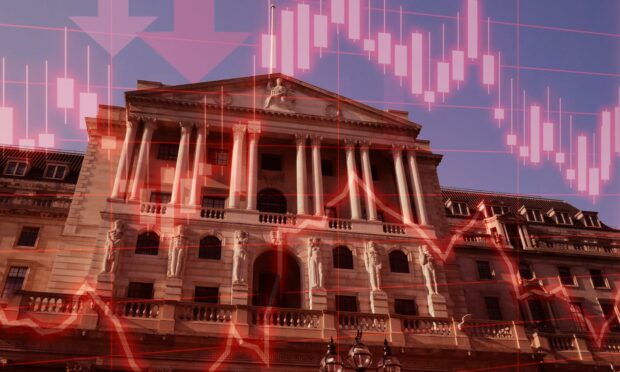Rising inflation has driven the Bank of England to raise interest rates despite the looming threat the Omicron variant presents to the UK economy.
The move surprised market watchers who expected the bank to delay interest rate rises as the businesses face losing critical trade in the run up to Christmas.
The Bank of England’s monetary policy committee (MPC) of nine members voted eight to one in favour of increasing interest rates to 0.25% from 0.1%, as inflation continues to soar beyond its target rate.
The move is unlikely to have an impact on household finances – yet. Instead they are more at risk of the continued rise in inflation.
Yesterday the Office for National Statistics (ONS) revealed inflation had hit a 10-year high of 5.1% in November, meaning some households would be faced with the choice of heating or eating to make it through the festive period.
Kevin Brown, savings specialist at Scottish Friendly, said: “For most households, today’s hike won’t make a huge difference to the pound in their pocket and families should keep a watchful eye on their finances to ensure they don’t get caught out by rising prices in the weeks and months ahead.”
Wolves (of inflation) are at the door
Mr Brown added: “The Bank of England has decided that action must be taken now to try and strengthen the pound and quell the rising cost of living.
“The wolves are at the door and although Omicron risks destabilising the UK economy, today’s decision is evidence that the Bank views inflation as the most immediate threat.
Meanwhile, the central bank will also keep up its £895 billion quantitative easing programme after a unanimous vote in favour.
Sterling jolted higher after the bank confirmed it will increase interest rates to 0.25%.
The pound moved 1.1% higher against the US dollar to 1.336, and 0.7% higher against the Euro to 1.181.
Suren Thiru, head of economics at the British Chambers of Commerce (BCC), said the move was “surprising given mounting uncertainty over the economic impact of the Omicron variant”.
Government must act on inflationary pressures
He added the rise was a sign the government needed to act to address issues causing inflation.
He said: “While policymakers are facing a tricky trade-off between surging inflation and a stalling recovery, with the current inflationary spike mostly driven by global factors, higher interest rates will do little to curb further increases in inflation.
“Instead, it is vital more than ever that the Government’s supply chain advisory group and industry taskforce start to provide some practical solutions to the supply and labour shortages that are continuing to stoke inflationary pressures.
“Without real improvement to the situation supply chains are currently facing rising prices are likely to continue to be an issue even with fiscal policy responses.”
CBI lead economist Alpesh Paleja said the decision meant the bank’s monetary policy committee want to “get off on the front foot in tackling rising inflation” and that more rate rises are likely to come – but that these will be cautious.
“We’re likely to see at least a couple more rate rises, as flagged in previous commentary from the committee,” he said.
“However, the emergence of the Omicron variant has raised uncertainty over the near-term outlook, so the MPC will likely move more cautiously.
“We could even see a return to the committee’s holding pattern on monetary policy, if there are strong signs of either the virus or Plan B restrictions dampening activity and price pressures
“But in either scenario, it’s important to remember the overall stance of monetary policy will remain very accommodative going forward.”
